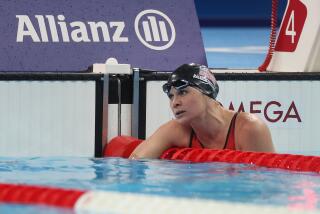Geared up for gold, Cavendish falters in cycling road race
- Share via
LONDON — — Over John Armah’s shoulder, about a quarter-mile away, was Buckingham Palace. Just around the corner was the prime minister’s residence. The stage was perfectly set for the apparently inevitable moment Saturday when reigning world champion cyclist Mark Cavendish would win Britain’s first gold medal of the 2012 Olympics.
Maybe the screen star previously known as Elizabeth II, who did a James Bond video skit for the opening ceremony, would nip over for another rendition of “God Save the Queen” at the medal presentation. After all, Prince Charles had come out to greet the riders before the road race began. And Prime Minister David Cameron did make it for the end, perhaps just to escape the music played at the beach volleyball venue in his backyard.
“Very noisy,” Cameron said.
Now it was two hours into the nearly six-hour road race. Armah, a Londoner among the millions of new British cycling fans since countryman Bradley Wiggins won the Tour de France last Sunday, stood at a barrier near the finish, trying to talk over loudspeakers alternately blaring music and race updates.
Armah refused to tempt the fates.
“If Cavendish would get a medal, I would be very grateful,” he said. “We do like to hype ourselves a lot.”
“Like the opening ceremony,” chimed in Armah’s 13-year-old son, Jordan.
So maybe there was something to the notion that the British team’s decision to wear gold-trimmed uniforms at the opening parade was hubris. Because the apparently unbeatable Cavendish and his supporting cast never were a factor in a race Kazakhstan’s Alexander Vinokurov won in a sprint over Colombia’s Rigoberto Uran Uran.
“The Games is about more than one medal from an event early on,” said Hugh Robertson, Britain’s sports and Olympics minister, upper lip appropriately stiff. “We will just have to look somewhere else for our first gold medal.”
Taylor Phinney of the United States felt as much disappointment as the Brits. He pounded the handlebars after losing a sprint for the bronze medal by a wheel to Alexander Kristoff of Norway.
“Now I have three days [before the time trial race] to lay in bed and hopefully not watch replays and cry curled up in a ball,” Phinney said, who added: “I’ll get over it.”
That Cavendish finished 29th was bad enough. That an ex-doper such as Vinokurov won made it even more galling for the Brits, who had indulged in a futile and highly sanctimonious campaign to keep athletes sanctioned for past doping violations out of their Olympics, no matter that their mandated suspensions had ended.
Over the last week, the country had been served up the apotheosis of Wiggins and endless encomiums about Britain’s rise in road cycling. Roll, Britannia.
“For a nation of plucky amateurs and plucky losers, it is amazing,” said Londoner Steve Cavalier.
So enormous crowds wanted to witness Cavendish’s ride to Britain’s first Olympic road race gold, bearing evidence to the BBC teaser that read, “The nation’s hopes rest on Mark Cavendish.” Fans were several deep along most of the 155-mile race over a largely loop course. It included nine climbs of 1.6-mile Box Hill, which provided its challenge less from grade steepness than repetitive annoyance.
“It just kind of wears on you and before you know it, it’s lights out,” said U.S. rider Tim Duggan, who took part as planned in an early breakaway before eventually finishing 88th.
It was shortly after the last traverse of Box Hill that a 30-rider group left Cavendish and his four teammates behind for good. Content to stay at the head of the trailing pack most of the race, the British had been on their own trying to close gaps, as rivals wanted no part of helping Cavendish exercise his feared sprinting skills at the end.
“Other teams were content that if they didn’t win, we wouldn’t win,” Cavendish said. “We expected it. If you want to win, you’ve got to take it to them.”
The final ascent of Box Hill also became the critical moment for Phinney, who used teammate Tejay van Garderen’s help to avoid being dropped.
Phinney would be pleased by getting into a position to sprint for a medal when he felt like easing off several times in the final 25 miles. That the effort left him just short provoked a different reaction.
“Never give up, never surrender, you might get fourth place in the Olympics,” Phinney said.
You can’t do sarcasm with a stiff upper lip.
More to Read
Go beyond the scoreboard
Get the latest on L.A.'s teams in the daily Sports Report newsletter.
You may occasionally receive promotional content from the Los Angeles Times.




